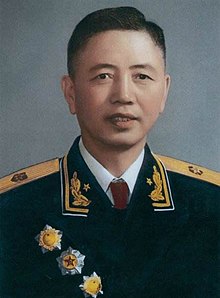Liu Huaqing
Liu Huaqing | |||||||
|---|---|---|---|---|---|---|---|
刘华清 | |||||||
 | |||||||
| Vice-Chairman of the Central Military Commission | |||||||
| In office State Commission: 28 March 1993 – 5 March 1998 Party Commission: November 1989 – 18 September 1997 | |||||||
| Chairman | Jiang Zemin | ||||||
| Commander of the People's Liberation Army Navy | |||||||
| In office August 1982 – January 1988 | |||||||
| Preceded by | Ye Fei | ||||||
| Succeeded by | Zhang Lianzhong | ||||||
| Personal details | |||||||
| Born | 1 October 1916 Huang'an County, Hubei, China | ||||||
| Died | 14 January 2011 (aged 94) Beijing, China | ||||||
| Political party | Chinese Communist Party | ||||||
| Children | Liu Zhuoming Liu Chaoying | ||||||
| Alma mater | Kuznetsov Naval Academy | ||||||
| Military service | |||||||
| Allegiance | |||||||
| Branch/service | |||||||
| Years of service | 1930–1998 | ||||||
| Rank | |||||||
| Awards | |||||||
| Chinese name | |||||||
| Simplified Chinese | 刘华清 | ||||||
| Traditional Chinese | 劉華清 | ||||||
| |||||||
Liu Huaqing (Chinese: 刘华清; 1 October 1916 – 14 January 2011)[1] was a Chinese revolutionary and an admiral of the People's Liberation Army Navy, who served as the third Commander-in-Chief of the Navy from 1982 through 1988. He is considered to have greatly contributed to the modernization of the Chinese Navy, and is hailed as the "father of the modern Chinese Navy" and "father of Chinese aircraft carriers".
Biography
Taking over the role of Navy Commander-in-Chief from his predecessor Ye Fei (who retired due to health problems), Liu had outlined a three-step process by which China would have a navy of global reach by the second half of the 21st century. In step one, from 2000 to 2010, China would develop a naval force that could operate up to the first island chain. In step two, from 2010 to 2020, China's navy would become a regional force capable of projecting force to the second island chain. In step three, to be achieved by 2040, China would possess a blue-water navy centered around aircraft carriers.[2] He was a strong advocate of the Chinese aircraft carrier programme.
Liu encouraged technological innovation within China that would increase naval capabilities, but he also advocated large foreign purchases. During the 1960s and 1970s, Liu was responsible for naval research and development before heading national military research.[3] He was also the top commander of the troops enforcing martial law to suppress the Tiananmen Square protests on 3–4 June 1989.[4] From 1992 to 1997 Liu was a member of the Politburo Standing Committee. He was the last Standing Committee member of an active military personnel. Since he left the Standing Committee in 1997, no other military leader has sat on the committee. Liu officially retired after stepping down as Vice Chairman of the Central Military Committee in March 1998.
Liu remained active through the mid-1990s and appeared in uniform at 2007 commemorations of the 80th anniversary of the founding of the People's Liberation Army in Beijing. He also appeared in Beijing during the 60th anniversary of the People's Republic of China on October 1, 2009.
Liu died on 14 January 2011 in Beijing.[5] His son Liu Zhuoming is a vice admiral of the PLA Navy.[6] His daughter Liu Chaoying, a former lieutenant colonel in the PLA, was a major figure in the 1996 United States campaign finance controversy.[7]
References
- ^ "人民网--404页面". Archived from the original on 23 February 2011. Retrieved 24 May 2018.
- ^ Dooley, Howard J. (Spring–Summer 2012). "The Great Leap Outward: China's Maritime Renaissance". The Journal of East Asian Affairs. 26 (1). Institute for National Security Strategy: 71. JSTOR 23257908.
- ^ Winterford, David (Winter 1993). "Chinese Naval Planning and Maritime Interests in the South China Sea: Implications for U.S. and Regional Security Policies". The Journal of American-East Asian Relations. 2 (4). Brill Publishers: 377. doi:10.1163/187656193X00121. ISSN 1058-3947. JSTOR 23613016.
- ^ Wu Renhua (吴仁华) (2009). 六四事件中的戒严部队 [The Martial Law Force in the Tiananmen Square protests of 1989] (in Chinese). Hong Kong: Truth Publishing House.
- ^ "China's former military leader passes away". People's Daily Online. 14 January 2011. Retrieved 14 January 2011.
- ^ Becker, Jeffrey; Liebenberg, David; Mackenzie, Peter (December 2013). "Behind the Periscope: Leadership in China's Navy". Defense Technical Information Center. p. 176. Archived from the original on 20 November 2015.
- ^ Liu's Deals With Chung: An Intercontinental Puzzle Washington Post, 24 May 1998. Retrieved 10 November 2020.
External links
- (in Chinese) Biography of Liu Huaqing
- Ruminations about how little we know about the PLA Navy. Conference on Chinese Military Affairs, 10 October 2000
